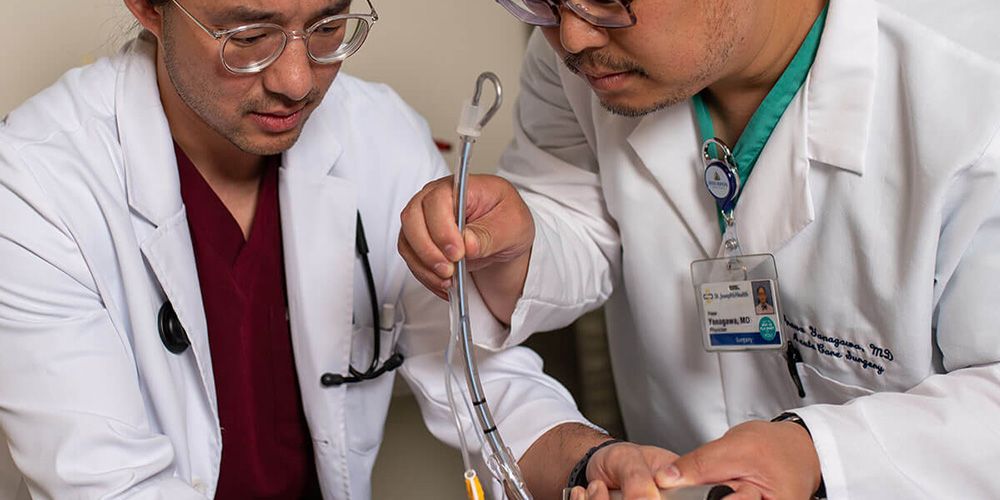You will complete several different phases of training on your journey to becoming a physician—from completing medical school prerequisites and enrolling in a Medical School program to participating in clinical rotations and eventually entering into a residency program.
There’s a lot of information for aspiring doctors to learn, and not all of it will take place in the classroom. While the first few years of your medical training will be facilitated by your institution’s faculty on campus, the hands-on training you’ll eventually receive will typically occur in a teaching hospital.
We’re sharing what to expect from teaching hospitals and outlining the various ways these medical institutions benefit our communities.
Hands-on training at teaching hospitals
Teaching hospitals partner with medical schools to teach med students, resident physicians, and other learners about the delivery of healthcare through hands-on learning and research. Practitioners-in-training gain experience in a real patient-care environment where they’re under the direct supervision of practicing physicians.
Teaching hospitals combine medical education, research, and patient care in a dynamic environment where the next generation of medical providers are trained. The opportunity to train in an operating medical center helps foster an environment of active learning and discovery for the next generation of medical providers.
Other medical professionals who may participate in training programs at teaching hospitals include nursing students, physician assistant students, and physical therapy students.
Why are teaching hospitals important?
It’s important to note that patients in these teaching hospitals always reserve the right to refuse to have students or residents involved in their care. But data consistently suggests that patients have few reservations when it comes to receiving care at a teaching hospital.
In fact, a recent report from the Association of American Medical Colleges (AAMC) revealed patients maintain that teaching hospitals outperform other hospitals in a litany of ways. Some of the top reasons cited include:
- Medical innovation
- Availability of the latest treatments
- Cutting-edge technology & equipment
Teaching hospitals are known for offering dynamic clinical programs where scientists and physicians work together to bring new treatments from the research desk to the bedside with both safety and efficiency. And the care patients receive is often higher quality. AAMC data has shown that patients treated at major teaching hospitals experience up to 20 percent higher odds of survival compared to those at non-teaching hospitals.
The consistent innovation and positive patient outcomes delivered by these health care facilities are well-known. It’s why teaching hospitals often receive a disproportionate amount of transfer cases—the facilities are able to provide care that other hospitals couldn’t.
Finally, the benefits of a teaching hospital are not limited to direct patient care. Teaching hospitals help contribute billions of dollars to the US economy. A 2022 report from the AAMC notes that the patient care, education, and research work completed at medical colleges and teaching hospitals adds more than $728 billion to the nation’s gross domestic product (GDP), accounting for 3.2 percent of the country’s total GDP. These institutions also support more than seven million jobs nationwide.
What is a clinical center ?
A clinical center is defined as a hospital, or group of hospitals, able to provide at least four or five core rotations and train 80 to 100 students at all times while also providing sub-internships, primary care rotations, and electives. SGU students complete their third-year core rotations as well as their fourth-year electives at clinical centers affiliated with the University.
SGU’s affiliated hospitals and clinical centers all have ACGME-accredited residency programs, so they train residents and students. In many cases, they will also train learners from other health-related disciplines, like nursing and PA students. These facilities place a strong emphasis on hands-on learning.
St. George’s University School of Medicine has provided high-quality clinical education for over 40 years and now has more than 70 formally affiliated US and UK teaching hospitals.
Train to become a dynamic physician
The facilities that provide you with your medical education can have a big impact on your future career as a physician. Teaching hospitals have a proven track record of not only training high-quality doctors but also providing an unmatched level of patient care.
As you narrow down your top contenders for where to attend medical school, one element you’ll want to consider is the quality of the hands-on training you’ll receive. Earning your MD is just the beginning—you will need to be sure you’re also set up for success as a resident physician and beyond.
For more information about the criteria you should be looking for, visit our article “How to Choose a Medical School: 8 Things to Evaluate Before Accepting.”


